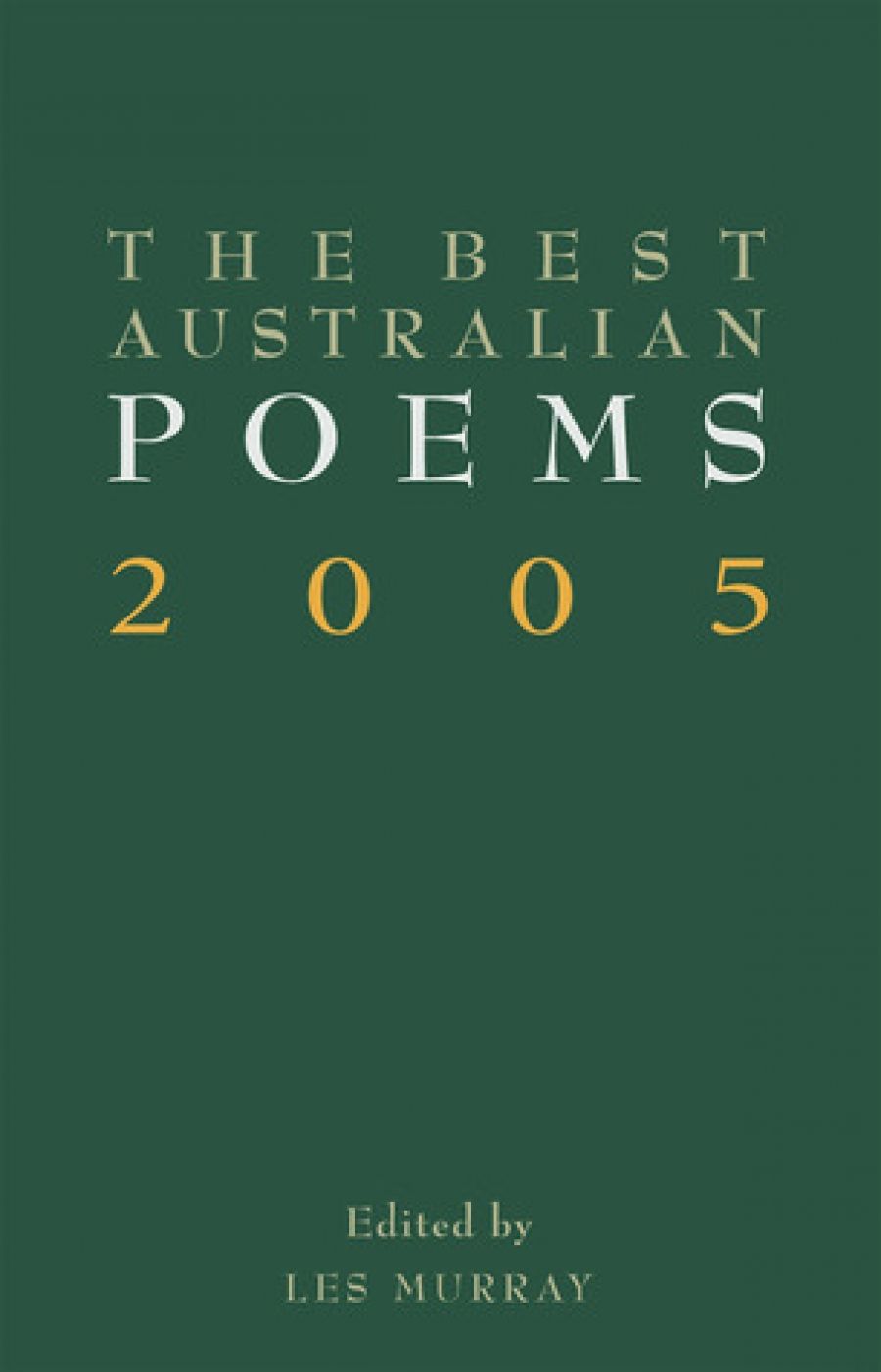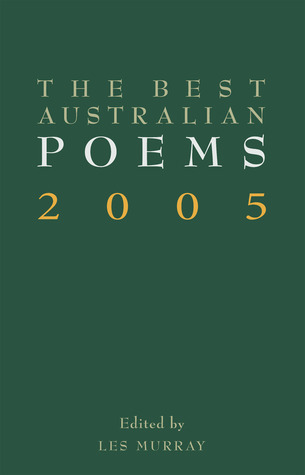
- Free Article: No
- Contents Category: Australian Poetry
- Review Article: Yes
- Article Title: Imprints on the mind
- Online Only: No
- Custom Highlight Text:
Annual anthologies of Australian poetry are, or should be, a good way to get an overview of the local poetry scene, as well as an opportunity to greet new poets and to keep in touch with established ones. This selection from more than a hundred poets fulfils that function pretty well, having a range of old and new names, styles and themes, even if the sourcing of the poems does seem weighted in favour of Quadrant, of which Les Murray is poetry editor. It’s the hubris in the title – Best Poems – that makes one cantankerously inclined to point to incomprehensible omissions. Readers with a mind to play that game can scrutinise some of the contenders that Murray passed over by reading Peter Porter’s rival anthology (David McCooey reviewed UQP’s Best Australian Poetry 2005 in the October 2005 issue of ABR). We have to accept, I think, that any anthology cannot help but bear signs of its editor’s preferences and prejudices, and no anthologist can hope to read every poem of the year. What matters, bearing in mind the need to be reasonably representative, is whether the chosen poems are good ones (although Some Good Australian Poems of 2005 might not be a highly marketable title).
- Book 1 Title: The Best Australian Poems 2005
- Book 1 Biblio: Black Inc., $24.95 pb, 184 pp, 1863951024
- Book 1 Cover Small (400 x 600):

- Book 1 Cover (800 x 1200):

There are many good poems in this collection, and I intend to mention some of these rather than the few that disappointed as insufficiently imagined, verbally clunky or so slight as to leave no imprint whatever on the mind. Not that ‘slight’, if we mean small and intellectually unassuming, automatically implies ‘not good’; Sue Stanford’s nine-line ‘Ode’ (to a roll of belly fat) charmed with the virtue of surprise. By alphabetical serendipity it is facing ‘Poems start to catch me by surprise’, the conclusion to Vivian Smith’s subtly lyrical ‘Eluard in Sydney’. Surprise is surely an element in good poetry, but it can come in many guises. Two poems that delighted by formal artfulness were Robert Gray’s ‘Among the Mountains of Guang-xi Province, in Southern China’ and Chris Mansell’s ‘Alexandrines’. Gray takes on Ezra Pound territory with confidence and an element of social consciousness that toughens the substance of ‘riding in the saddle of a cloud’; the technical control called for by Mansell’s playful decision to write in alexandrines about Alexandria is mastered without loss of her characteristic and attractive energy. Energy and ebullience in cataloguing the contradictions of maternity mark Alison Bartlett’s ‘Breastfeeding’; a selection from Hecate is something of a surprise, but Murray likes feistiness and this is feisty.
There are poems that surprise us into taking a new look at settled ideas: Kirsty Sangster on the mind/body dichotomy in ‘Erasmus in the High Country’; or David Mortimer arguing for Handel as a man of ‘iron imagination’. Poems, too, that spring narrative surprises: the final answer to Sheryl Perssons’ ‘What does your father do?’ sits disconcertingly with the polite composure of the poem’s manner. Yet, however interesting the ideas may be, a poem works through its language, its rhythm, its structure. To see vitality given to traditional practice is one of poetry’s pleasures. For instance, most of the poems in this collection follow the convention of closure in the final line. Some, Chris Wallace-Crabbe’s for instance, self-consciously lighten the effect, but others surprise us by an absolute authority of voice. Peter Porter is a master of strong closure and doesn’t disappoint here, but of all these final lines I remember best the desolate ‘Silence is a cold and difficult language’ of Robyn Rowlands’ ‘Silence’.
The alternative trailing ending, opening out rather than closing, is used to best effect in Tony Birch’s ‘Footnote to a “History War”’, a spare and moving sequence based on early indigenous letters and photographs that exemplifies poetry’s power to create a discourse on ‘issues’ different in its effect on our sensibilities from the language of academia or journalism. An eye for evocative detail is part of that power: agonising over the colour of a dress encapsulates the trapped life of a self-blaming victim of domestic violence in Bruce Dawe’s ‘The Blue Dress’.
It should be clear that a good poem does not always surprise by joy, but one poem raises the question of how we react when surprise becomes shock. Grisliness, we know, is fashionable in films, and I generally admire Judith Beveridge’s poetry, but ‘The Shark’ made me as queasy as the people in the poem. I can see it has a solidity of detail, a resoluteness in the face of physical blood and guts that are qualities that Murray approves, but I turn with relief to a less gothic stoicism in Jim Dooley’s admirably unsentimental ‘Pioneer Photograph’.
Murray is notoriously unsympathetic to either sentimentality or the cant (and rant) that can taint polemical poems. Mary Gilmore’s ‘Judged’ is polemical, powerfully plain-spoken, and a surprising inclusion among the poems of 2005. Murray’s justification is that he’s giving first airing to a freshly discovered unpublished work. ‘Judged’ was in fact published in the Tasmanian Democrat on 24 April 1896, signed M.J.C. for Gilmore’s unmarried name Mary Jean Cameron. Except for a printing delay over belated permissions problems, the Academy Edition of The Collected Verse of Mary Gilmore (reviewed by Vivian Smith in the February 2006 issue of ABR) would have been available in November 2004 and there Murray would have found the poem’s publication history. At least ‘Judged’ is among her best early work, so it vindicates his eye for a good poem, which is what matters in an anthologist.


Comments powered by CComment